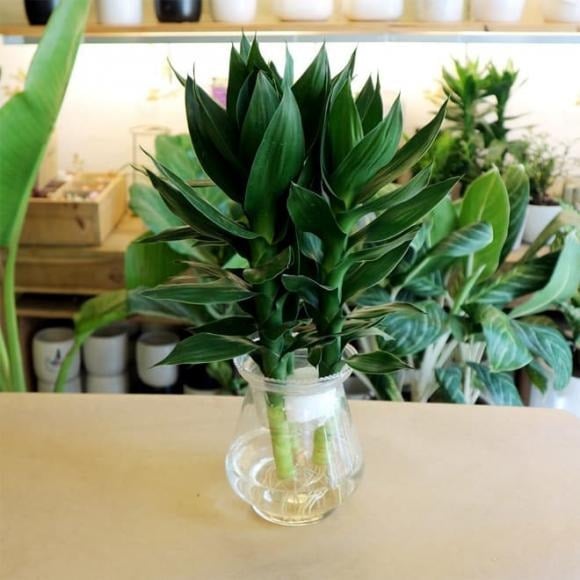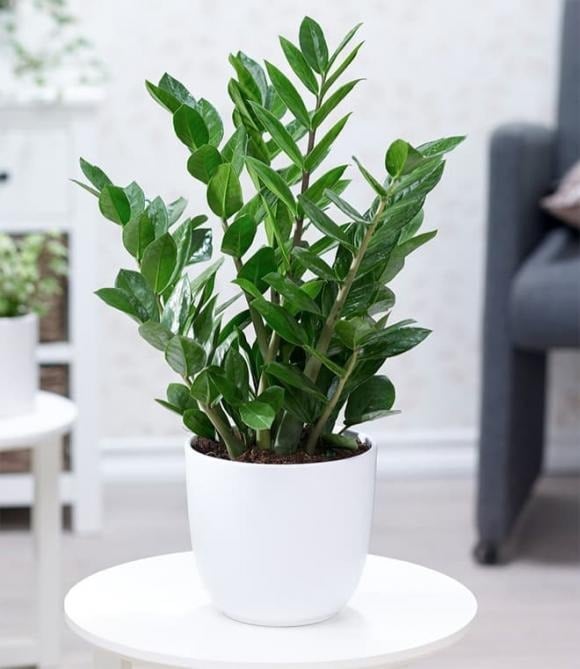Placing aquatic plants on the God of Wealth altar is not only a decorative element but also carries profound spiritual and religious meanings. The God of Wealth altar is an essential aspect of feng shui, especially in shops, companies, and business-oriented households, as it is believed to bring financial luck, business prosperity, and career advancement.
According to feng shui experts, placing certain types of plants next to the altar not only helps create a harmonious space but also contributes to the well-being, abundant health, and career success of the homeowners.
Why are aquatic plants often placed on the God of Wealth altar?
The presence of aquatic plants on the God of Wealth altar serves both decorative and profound feng shui and religious purposes.
In East Asian culture, feng shui plays a crucial role in interior design and living space decoration. Aquatic plants are seen as symbols of growth and prosperity, representing vibrant life and continuous development. Water, an essential element for the survival of aquatic plants, also symbolizes wealth, prosperity, and affluence. A thriving green plant not only signifies reproduction but also hints at growth and development.

The presence of aquatic plants on the God of Wealth altar adds decorative beauty and holds profound spiritual and feng shui meanings.
Combining aquatic plants with the God of Wealth altar enhances aesthetic appeal, stimulates positive energy, and attracts wealth and good fortune. Business owners and shopkeepers often place aquatic plants on the altar to express their aspirations for career advancement and success. The lush greenery of these plants reminds homeowners of their faith and hope for the future, instilling a sense of reassurance and optimism.
Apart from their feng shui significance, aquatic plants are also adept at purifying the air and creating a wholesome living environment. They absorb toxins and improve air quality, especially in confined spaces like the God of Wealth altar.
Aquatic plants are low-maintenance and do not require much time and effort. They can thrive long-term in a water environment without the need for strong light or soil, making them ideal for busy individuals. Periodic water changes and placement in a naturally lit area are all that is needed for these plants to flourish and maintain their beauty over the long term.
With their graceful and delicate appearance, aquatic plants seamlessly blend with other decorative elements on the God of Wealth altar, creating a vibrant and harmonious space. A beautifully adorned altar not only provides a sense of comfort but also demonstrates the homeowners’ respect and reverence for the deities.
4 types of plants recommended by feng shui experts to place next to the God of Wealth altar for attracting wealth and good fortune
Money Tree Plant
The Money Tree Plant is a popular feng shui plant often placed next to the altars of the God of Wealth, the God of Earth, or in offices. With its robust stem, upward-reaching branches, and glossy leaf stalks, the Money Tree stands out for its year-round lush greenery. Notably, those that have flowered are believed to bring the most financial luck.
This plant comes in various sizes, typically ranging from 30 to 60 cm. It is easy to grow, requires minimal water, and has a long lifespan, making it an ideal choice for placement next to the God of Wealth altar.

The Money Tree Plant is a popular choice for feng shui, often placed next to the altars of the God of Wealth or in offices.
Lucky Bamboo
Lucky Bamboo carries feng shui meanings of wealth, luck, and success for homeowners. It thrives year-round, requiring minimal light and care. Lucky Bamboo typically grows to a height of 40 to 50 cm, making it suitable for God of Wealth altars in compact spaces. It is also a popular choice for office desks.
Unlike many other ornamental plants, Lucky Bamboo only needs a small water vessel to thrive, creating a cool and soothing ambiance for interiors and altars.
Peace Lily
The Peace Lily, with its red leaves edged in green, symbolizes good luck and abundant wealth. It is commonly grown in water-filled vases or soil pots, adding a striking touch to the God of Wealth altar.
Money Tree
The Money Tree, also known as the “money tree,” signifies wealth and prosperity. As a result, it is frequently chosen to be placed next to the God of Wealth altar or in prominent locations in homes and offices. The Money Tree has quickly become a popular choice for office and home decor in Vietnam.
Notes on placing plants near the God of Wealth altar
When using aquatic plants, it is essential to change the water regularly to keep it clean and free from mosquito larvae. The plants should always look healthy and vibrant, with no signs of wilting, unpleasant odors, or dirt, as these could indicate the dissipation of wealth.
The plants placed on the God of Wealth altar should be proportionate to the space to avoid creating an overly crowded and dark setting.
The Smaller, the Richer: Three Traits Women Possess That Lead to Wealth and Prosperity
In the world of physiognomy, there is a belief that certain facial features can predict a woman’s wealth and prosperity. It is said that those who possess these three specific traits are destined for a life of abundance and ever-increasing affluence.


























 Prosperity
Prosperity









